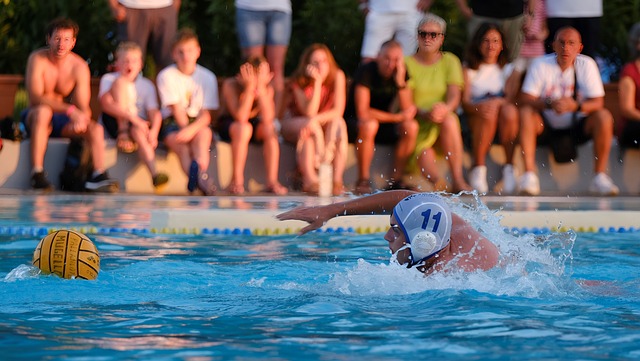Are you looking for a fun and challenging way to improve your swimming skills? Look no further than water polo! This intense sport not only provides a great cardiovascular workout, but it also helps to build strength and endurance in the water. In this article, we will explore the ways in which playing water polo can benefit your swimming abilities. Whether you’re a competitive swimmer or just looking to improve your overall fitness, water polo is a great way to take your aquatic abilities to the next level. So, let’s dive in and discover the many ways in which water polo can help improve your swimming!
Water polo is a high-intensity sport that requires a lot of physical fitness, including strength, endurance, and agility. Players must swim back and forth across the pool while also treading water, passing the ball, and shooting on goal.
This constant movement and physical exertion can help to build cardiovascular endurance, increase lung capacity, and improve overall fitness levels.
Additionally, the strength and agility required for water polo can help to build muscle and improve flexibility, which can also be beneficial for swimmers.
While water polo and swimming are different sports, they share many similarities. Both require a lot of time in the water, and both require a high level of physical fitness.
If you are a swimmer who is looking to improve your game, adding water polo to your training regimen can be a great way to build strength, endurance, and overall fitness.
Additionally, water polo can be a fun and challenging sport that can help to keep you motivated and engaged in your training.
The Benefits of Water Polo for Swimmers
Improved Endurance
Water polo is a high-intensity sport that requires swimmers to swim continuously for extended periods. Playing water polo can improve your cardiovascular endurance, which can translate to better performances in swimming events.
The constant swimming and treading water involved in water polo can help you build up your lung capacity and increase your ability to swim longer distances without getting fatigued.
Enhanced Upper Body Strength
Water polo involves a lot of upper body movements, such as throwing the ball and swimming with your arms. As a result, playing water polo can help you develop upper body strength, which is essential for swimming. By strengthening your upper body muscles, you can improve your swimming technique and reduce your risk of injuries.
Increased Core Stability
Water polo requires a lot of core stability, as players need to maintain balance and control while moving through the water. Playing water polo can help you develop a strong core, which is essential for swimming.
A strong core can help you maintain proper body alignment and reduce drag in the water, which can lead to faster swimming times.
In summary, playing water polo can have numerous benefits for swimmers. It can improve your endurance, enhance your upper body strength, and increase your core stability. If you’re looking for a fun and challenging way to improve your swimming skills, consider giving water polo a try.
Techniques Learned in Water Polo That Benefit Swimming
Breath Control
Water polo players need to have good breath control to stay underwater for longer periods of time. Holding your breath for extended periods of time can improve your lung capacity and endurance, which can benefit your swimming performance.
In water polo, players often need to hold their breath while defending or attacking. This skill can translate to swimming, where you can use it to improve your swimming technique and speed.
Body Positioning
In water polo, players need to maintain a horizontal body position to move quickly and efficiently through the water. This skill can translate to swimming, where maintaining a good body position can reduce drag and improve your speed. By keeping your body parallel to the water’s surface, you can reduce the resistance of the water and move more efficiently. Water polo players also learn to use their core muscles to maintain a stable body position, which can help in swimming.
Treading Water
Treading water is a crucial skill in water polo, and it can also benefit your swimming. In water polo, players need to tread water to stay in position while attacking or defending.
This skill can translate to swimming, where you can use it to conserve energy and stay in one place without touching the bottom of the pool. Treading water can also improve your leg strength and endurance, which can benefit your swimming performance.
Overall, water polo can help improve your swimming technique and performance by teaching you valuable skills such as breath control, body positioning, and treading water.
By incorporating these techniques into your swimming training, you can improve your speed, endurance, and overall swimming ability.
Potential Drawbacks of Water Polo for Swimmers
If you are considering adding water polo to your training regimen to improve your swimming skills, it is important to be aware of some of the potential drawbacks that come with playing this sport. Here are a few things to keep in mind:
Risk of Shoulder Injuries
Water polo involves a lot of overhead throwing, which can put a significant amount of stress on your shoulders. As a result, swimmers who also play water polo are at a higher risk of developing shoulder injuries such as rotator cuff tears or tendinitis. To minimize your risk of injury, it is important to properly warm up before playing and to use proper throwing technique.
Limited Lower Body Workout
While water polo does require a significant amount of swimming, it primarily focuses on upper body strength and endurance.
This means that swimmers who play water polo may not be getting a well-rounded workout that targets both their upper and lower body.
To ensure that you are still getting a comprehensive workout, you may want to consider adding other lower body exercises to your routine.
Time Commitment
Playing water polo can be a significant time commitment, as it often involves multiple practices and games per week. This can make it challenging to balance your water polo training with your swimming training, as well as other commitments such as school or work.
Before deciding to add water polo to your routine, be sure to consider whether you have the time and energy to commit to the sport.
Conclusion
Overall, water polo can be a great sport to help improve your swimming skills. Through the intense training and conditioning required for water polo, you can build up your endurance and strength in the water.
Plus, the unique skills required for water polo, such as treading water and passing the ball, can also translate to improved swimming abilities.
However, it’s important to keep in mind that water polo is a team sport and may not be for everyone. If you prefer individual sports or simply don’t enjoy the physical demands of water polo, there are plenty of other ways to improve your swimming skills. Joining a swim team or taking swimming lessons can also be effective ways to enhance your abilities in the water.
Ultimately, the best way to determine if water polo is right for you is to give it a try. If you enjoy the sport and find that it helps improve your swimming, then it may be worth pursuing further.
But if it’s not your cup of tea, don’t worry – there are plenty of other options available to help you become a stronger and more confident swimmer.







